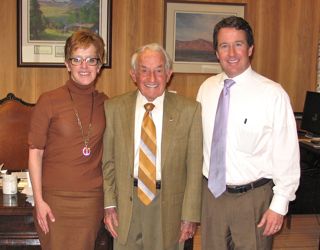Nevada Gaming Commissioner Michonne Ascuaga Linked to Federal Investigation
Posted on: February 12, 2016, 12:32h.
Last updated on: February 12, 2016, 12:32h.

A member of the Nevada Gaming Commission (NGC) was this week linked to a federal investigation probing the resort she previously managed for 16 years. NGC member Michonne Ascuaga, whose family once owned a northern Nevada resort, is the target of a federal anti-money laundering review.
According to the United States Department of Treasury’s Financial Crimes Enforcement Network (FinCEN), the Nugget Casino Resort in Sparks, Nevada, failed to implement appropriate safeguards to combat money laundering at the gambling destination near Reno.
Ascuaga oversaw the resort’s operations from 1997 until her family’s sale of the property in 2013.
Nevada Governor Brian Sandoval (R) appointed Ascuaga to the NGC in April of last year. At the time, she said, “As a former licensee for over a decade, I hold a deep respect for the commission and look forward to this new challenge as an industry regulator.”
Failure to Report
Federal and state law mandates that Currency Transaction Reports (CTR) be generated when customers buy or cash out $10,000 or more in gaming chips during a single 24-hour period.
“Federal law requires casinos and card clubs to report currency transactions over $10,000 conducted by, or on behalf of, one person, as well as multiple currency transactions that aggregate to over $10,000 in a single day,” FinCEN states. “The federal law that requires the filing of these reports was passed to safeguard against money laundering and other financial crime.”
The statutes are all part of the Bank Secrecy Act of 1970, a law that requires financial institutions to assist the US government in detecting and preventing money laundering. Casino banks are considered such depositories.
During the Ascuaga family’s sale of the Nugget, FinCEN discovered that the casino wasn’t properly recording such ledgers, which is a violation of state and federal law that could result in substantial fines levied on both the previous and current Nugget owner.
Little Nugget of Info
Private investment group Wolfhound Holdings acquired the Nugget for an undisclosed sum, but claims it learned of the FinCEN investigation on the eve of the sale’s closing, a notion that Ascuaga disputes.
While she was apparently aware of the FinCEN query during Sandoval’s vetting process in nominating her to the NGC, she decided the information wasn’t relevant and opted not to disclose it, although she claims this was in no way duplicitous on her part.
“The Sparks Nugget was informed in November 2013 by the Department of Treasury that the Department was investigating whether it was appropriate to impose civil penalties for possible violations of anti-money laundering regulations,” Ascuaga said in a statement. “This was all disclosed immediately to the buyer.”
Ascuaga argues that since the property was no longer under her control and that the alleged violations had been transferred to Wolfhound, her hands were clean of any wrongdoing.
“As a result, I did not feel it necessary to inform the Governor,” she stated. “Let me be direct, I did not purposely hold back information from the Governor.”
In what will now be seen as a rather ironic, or perhaps hypocritical occurrence, Ascuaga voted to fine Caesars Entertainment Group $1.5 million last fall for money-laundering violations.
At this time, her term with the NGC is slated to end in April of 2017.
No comments yet